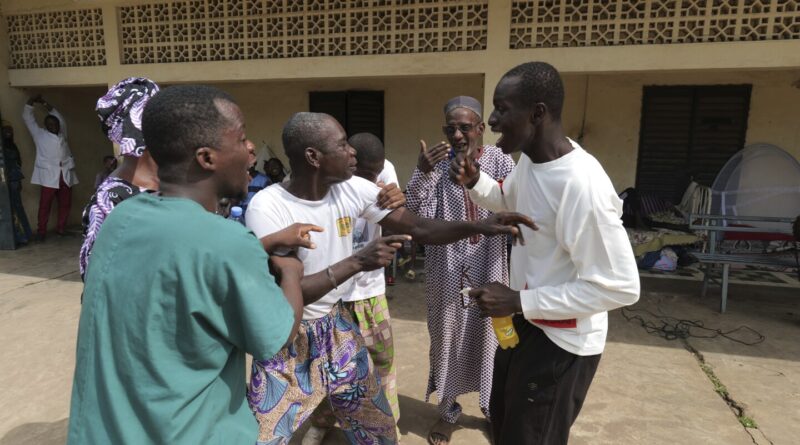The traditional theater of Mali gives space to the mentally ill
BAMAKO, Mali (AP) – In a psychiatric ward in Mali’s capital, a small group of patients creates scenes of a village brawl to the beat of the djembe, a traditional West African drum.
One patient, Mamadou Diarra, shouts at the other in the Sebambara language, mocking: “You know nothing! It’s just nonsense!”
But they both smile, and Diarra dances as he continues to insult his teammate.
The group takes part in koteba, a traditional form of theater used by Mali’s largest tribe, the Bambara. It combines acting, singing and dancing and is often performed in villages as a way of solving problems and an open space for joking.
But here at Point G, one of the largest hospitals in Bamako, koteba is also a way to provide support and a sense of community to people receiving mental health care.
Mali has less than 50 mental health professionals for a population of more than 20 million, according to the World Health Organization’s 2022 report. People with mental illnesses are often left untreated and marginalized from society.
Although the use of koteba as a treatment has not been formally studied, Souleymane Coulibaly, a clinical psychologist at Point G Hospital, said that the traditional form of theater is in a unique position to help people in the psychiatric ward to deal with their problems.
He said: “Patients who go to Koteba leave the hospital faster than those who refuse to go to the conference.
In the field, Diarra was the star, and other patients gathered as he spoke.
“I have never done any kind of theater before. I have never danced. But as soon as I started, God gave me the knowledge of these things,” he said.
Adama Bagayoko, 67, director of the visiting group, says Point G’s weekly performances are a rare place where patients feel heard and respected.
“We talk to each other, we dance together, we laugh together,” said Bagayoko. Touching someone shows that we are equal, listening to them shows that they are important, and what they say is important.”
Gayayoko was part of the team that brought koteba to the Point G psychiatric center in 1983, when mental health workers were looking for a way to use traditional Mali techniques to help people receiving care. mind.
The first performance was so effective that the patients asked the doctors if the actors could return the next day, he said.
Patients and actors have been meeting for koteba performances every Friday since then.
The performances of koteba in Point G happen in three stages, Bagayoko said. First, the band plays music to invite patients to the field. The group then asks what the topic or theme of the day’s activity should be. After the operation, they sit in a circle and give any patients who wish to talk down.
Because patients feel comfortable, they often tell actors things about their lives that they are uncomfortable sharing with their families or doctors, which can help doctors get to the bottom of any issue they are dealing with. I can deal with it, Bagayoko said.
On a recent Friday, patients did a common event in Mali: A man in the village is accused of stealing. The thief shouts and says that he has not stolen anything, while the villagers ask Diarra, playing the village chief, what punishment he deserves.
“Kill him!” Diarra shouts through the screams. But when an angry mob gathers around the man, he flees and flees.
Gayayoko said the group does other themes suggested by patients including those about women being beaten by their husbands, drug problems and alcoholism.
Point G Hospital is just a short walk from Mali’s political center – the presidential palace and the main military base – where the 2020 military coup has left the country reeling. extreme violence and economic problems. Last month, Islamic militants attacked Bamako for the first time in almost ten years.
But those problems are far removed during the hospital dramas, as Diarra and her fellow patients are immersed in the world they create.
“You know what my problem is? That I see things as they are,” Diarra said, laughing, during a break.
Bagayoko said: “Okay, we will lighten the load for you.”
___
The Associated Press receives funding for global health protection and development in Africa from the Gates Foundation. AP is solely responsible for all content. Find APs standards for working with philanthropies, a list of sponsors and shelters funded by AP.org.
#traditional #theater #Mali #space #mentally #ill
